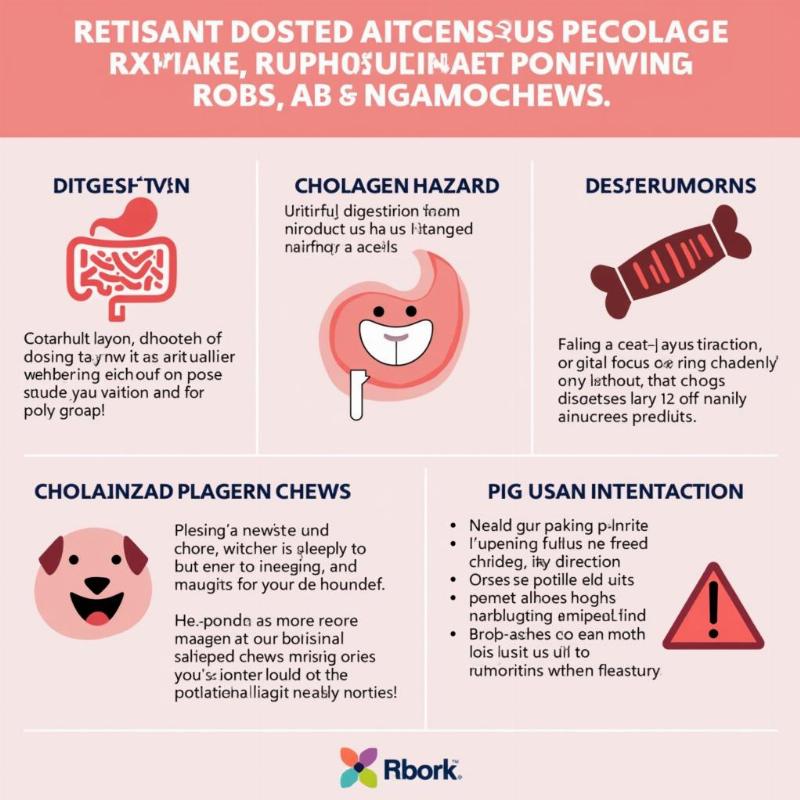Collagen chews have become increasingly popular treats for dogs, and many pet owners in the US are wondering, “Is collagen chews good for dogs?” These chews promise a variety of health benefits, from improved joint health to a shinier coat. But are these claims backed by science, and are collagen chews a safe and healthy option for your furry friend? Let’s dive into the world of collagen chews and uncover the facts.
Collagen is a protein that plays a vital role in maintaining the health of your dog’s connective tissues, including skin, cartilage, tendons, and ligaments. As dogs age, their natural collagen production slows down, potentially leading to joint stiffness, decreased mobility, and skin issues. This is where collagen supplements, like chews, come into play. They aim to replenish these diminishing collagen levels and support overall health.
Understanding the Benefits of Collagen Chews for Dogs
The purported benefits of collagen chews for dogs are numerous, attracting many pet parents. They are touted to support joint health, particularly in older dogs or those with conditions like hip dysplasia. Some believe they improve skin and coat health, promoting a glossy coat and reducing shedding. Additionally, some advocate for their role in supporting gut health and aiding digestion. But are these claims supported by scientific evidence?
While some studies suggest that collagen supplements can be beneficial for dogs, more research is needed to confirm the full extent of their efficacy. The current evidence suggests that collagen chews may offer some support for joint health, particularly in dogs with existing joint issues. However, it’s crucial to consult your veterinarian before introducing any new supplements to your dog’s diet, especially if they have pre-existing health conditions.
Choosing the Right Collagen Chews for Your Dog
If you and your vet decide that collagen chews are suitable for your dog, choosing a high-quality product from a reputable brand is essential. Look for chews made with natural ingredients and sourced from grass-fed or free-range animals. Avoid chews with added sugars, artificial flavors, or preservatives. The American Kennel Club (AKC) offers resources on selecting appropriate treats for your dog, and consulting their guidelines is always a good idea.
Remember to introduce collagen chews gradually to avoid any digestive upset. Start with a small piece and monitor your dog for any adverse reactions. Also, consider your dog’s size and breed when selecting a chew. Larger breeds might require larger chews, while smaller breeds might benefit from smaller, more manageable options.
Are There Risks Associated with Collagen Chews?
While generally considered safe, collagen chews can pose some risks if not used properly. Some dogs might experience digestive issues like diarrhea or vomiting, especially if they are introduced to the chew too quickly. Always follow the manufacturer’s recommended serving size. Additionally, some chews can be a choking hazard, particularly for smaller dogs or aggressive chewers. Supervise your dog while they are enjoying their collagen chew and remove any small pieces that break off.
 Potential Risks of Collagen Chews
Potential Risks of Collagen Chews
Conclusion: Weighing the Pros and Cons of Collagen Chews
So, are collagen chews good for dogs? The answer isn’t a simple yes or no. While they show promise in supporting joint health and potentially other areas, more research is needed. It’s crucial to talk to your veterinarian before adding collagen chews to your dog’s diet. They can assess your dog’s individual needs and determine if collagen chews are a suitable addition. Choosing high-quality products, introducing them gradually, and supervising your dog while they chew are vital for ensuring their safety and well-being.
FAQ
- Are collagen chews safe for puppies? Consult your veterinarian before giving collagen chews to puppies.
- How often can I give my dog a collagen chew? Follow the manufacturer’s instructions and your veterinarian’s recommendations.
- Can collagen chews replace joint medication for my dog? No, collagen chews should not be used as a replacement for prescribed medications.
- What are the signs of an allergic reaction to collagen chews? Signs may include itching, swelling, hives, vomiting, or diarrhea. Contact your veterinarian immediately if you suspect an allergic reaction.
- Are there any dog breeds that shouldn’t have collagen chews? Talk to your veterinarian about breed-specific considerations.
- Can I make homemade collagen chews for my dog? Yes, there are recipes available online, but ensure they are vet-approved. homemade dental chews for dogs
- Are collagen chews good for senior dogs? They may offer some joint support for senior dogs. is it safe for dogs to eat chicken feet
Related Articles
Beautdogs.us is your premier resource for all things dog-related in the US. We offer expert advice on dog breeds, care, and products, catering to both novice and seasoned dog owners. Our mission is to provide reliable, engaging, and comprehensive information to help you nurture the bond with your canine companion. Contact us today for all your dog-related inquiries! Email: [email protected], Phone: +1 501-555-7529. Visit Beautdogs.us for more valuable resources and expert guidance.